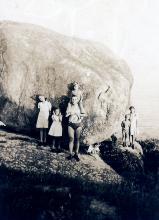Well at about 5 p.m. I posted up to Maudie to say we would be unable to come that evening. While we were talking we heard a drone of planes and some explosions. The paper on Monday had said there would be AA practice in this locality between 10 and 12 a.m. on Tuesday, and at first we thought it must be this practice starting off a bit behind schedule. Then we saw people opposite at St Stephens pointing excitedly at the sky; so we flew downstairs to see what was afoot. The sky was full of puffs of smoke as scores of shells burst at a considerable height. Then high up we saw a formation of 6 big bombers! They were very high as we could tell by the atmospheric haze between them and us, for though there were clouds about, the atmosphere seemed pretty clear. For all their height we could see they were really big chaps – probably American ‘flying fortresses’. Their shape was different from any Japanese planes we had seen and the drone of their engines was different too. We had heard the crump of heavy explosions when we were upstairs in the building and when we saw the planes I think they had just finished their attack and were just sailing off in perfect formation with the AA shells bursting nowhere near them and feet below them: in fact, except for the far greater quantity of stuff put up by the Jap guns, I thought their shooting was just as ineffective as our own during the blitz! The American planes this time had indulged in high altitude bombing and had not done any diving. When I got back to our block I was told that this flight of planes had two tiny fighter planes escorting them.
Before I returned, Maudie gave me two pieces of cake from Peg’s birthday cake which she had made the day before. Very good it was too. Well, that certainly was an exciting day – naturally we expected (and got) a complete blackout that evening. Still, we didn’t mind so much this time, for there was plenty to sit and talk about in the dark.
The next morning I was standing in the queue outside our block clinic, waiting to consult Dr Smalley about a rash I had developed. This was about 10.00 a.m. Suddenly I heard the distant drone of planes and immediately rushed outside Block 2 to have a ‘Look see’. Soon the AA guns were popping away, the shells again bursting high in the sky and far away to the north, presumably over the New Territories. (On the Monday the planes had flown over the harbour and dock area). In fact we saw very little of the firing and caught no sight of planes, (at least I did not), but Harold said he saw them and heard the thud of bombs. He said there were six of them, as before.
The paper, that day, referring to the raid on the previous day said: - The attackers were driven off by our anti aircraft fire. All the bombs dropped fell into the harbour, so no damage was done – “driven off”! They jolly well sailed off when and as they liked with complete impunity. And I find it hard to believe they did no damage. The only worrying thought is for our friends still in town and the unfortunate Chinese whose lives are endangered by these raids. One imagines the planes were concentrating most of their attention on the Tai Koo Docks, Naval Dockyard, military barracks and, in the New Territories, the railway perhaps and possibly oil dumps.

